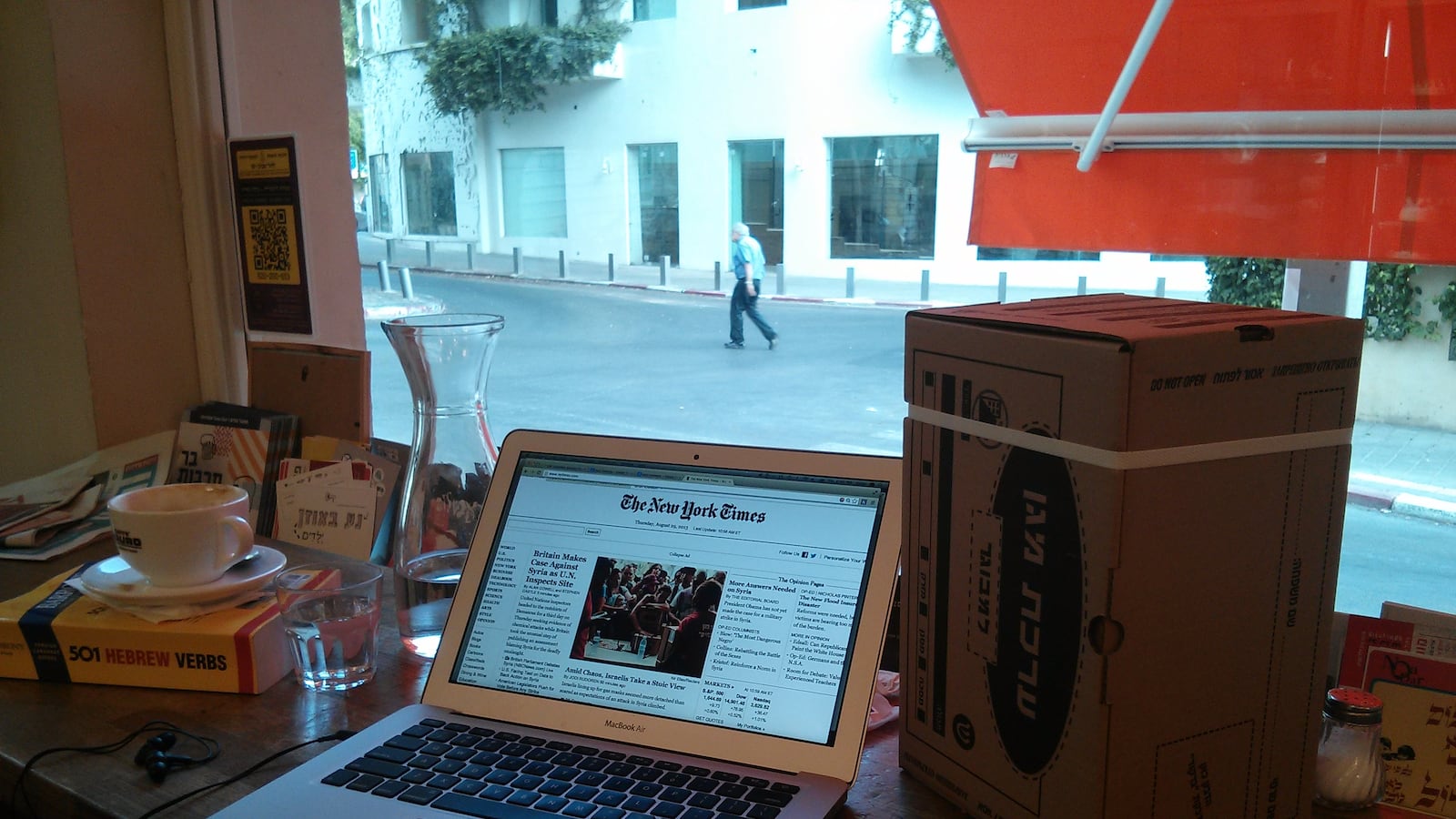Tel Aviv is known locally as "the Bubble," and, sometimes, the “state of Tel Aviv.” I prefer “republic of Tel Aviv,” but aesthetics aside, it is a small city that resembles Greenwich Village on steroids, and entirely differentiated from the rest of the country in the same way that New York is not quite “Real America” (to borrow a phrase). I moved here last summer from New York, the city that makes all others feel like glorified small towns. But Tel Aviv is one great town, so the comedown wasn’t at all unpleasant. The downtown area of Tel Aviv is remarkably large for a city of only 400,000 and even for a metropolitan area of about 3 million (which, admittedly, is about half the population of the country.) Tel Aviv is deeply impressive for its sophistication, culture, arts scene, hipster penetration levels, outrageous prices, gorgeous beaches and boulevards, and for the sheer availability of things.

Much of the time, Tel Aviv feels about as distant from the Arab-Israeli conflict as Berkeley, where I have lived, and Sydney, where I am from. Usually the bombs do not fall here, and there is a surreality to it when they do. Last November’s rockets from Gaza, and the bus bombing around the corner from where I live, were shocking, to be sure, but almost immediately became lost in the activity of a city that epitomizes the Zionist ideal of Jewish normalization. It is easy to forget you are in Israel, let alone the Middle East.
Tel Aviv's residents are broadly supportive of the peace process with the Palestinians. People here tend to share the belief that two states for two peoples is the only viable vision for maintaining both the state’s Jewishness and its democracy. I am of this cultural and political milieu, even if I am not from it.
A few days ago, my girlfriend asked me if I’d seen the pictures of the chemical attack in Damascus. I hadn’t. But then in a meeting I attended between an ambassador and a senior politician, the pictures came up again, and I realized the gravity of the situation.
In my experience, there’s always this mental disconnect between a news story (“My god, that’s horrific”) and the moment it dawns on you that the news story could affect you (“What do you mean the Lower East Side is likely to be flooded when the storm hits?”).
In few other Western cities, if any, would a regional strike on a murderous regime like Assad’s even be on the agenda. Apart from Kosovo in 1999, I can think of none.
It is unlikely that Assad would be suicidal enough, or Hezbollah self-defeating enough, to attack Israel right now, let alone with chemical weapons. And yet it is a possibility.
Hezbollah has huge warheads that can take out entire buildings, and plenty of rockets capable of delivering them, courtesy of its patron, Iran. And the whole point of Israeli airstrikes on Syrian and Lebanese targets over the last year have been to prevent a Syrian handoff of non-conventional weapons to Hezbollah. Who knows if some of them slipped through? Who knows if Assad might use them?
Diaspora Jews tend to be cautious, and their Israeli cousins are no different. There has been a run on gas masks in recent days, and articles in the newspapers about what to do in case of a chemical attack.
It was sobering to experience the Gaza rockets over Tel Aviv’s skies last November, and at times chilling. Today, my task list included not just writing this article, going to the gym, editing a few documents, and picking up the groceries for the weekend, but also obtaining a gas mask for my girlfriend and myself.
I imagine a chemical warhead exploding in the square in front of the café I am sitting at right now, and what exactly I could do to protect myself. My newly acquired gas mask sits beside me, and I am comforted.
I won’t get into the consequences of what would happen, geopolitically, if such an event were to occur, except to say that Israel would certainly respond. Iran might get involved, too.
I will say that the drumbeat of airstrikes against a Middle Eastern country feels substantially different when you live next door. And although your politics may not change, experiencing the fear of such things, and acknowledging the dangerous neighborhood in which Israel resides, is invaluable.
When people discuss the conflict, and the policies of the Israeli government, the discourse is often on an almost academic level. For this reason, we frequently hear silly suggestions, such as those in favor of a binational state or of annexing the West Bank.
While there is no shortage of cranks and extremists in Israel, there is good reason why the majority of Israelis basically support a two-state solution while they simultaneously distrust their neighbors. Israelis know this region, and they have a gut-level understanding of the conflict.
We all hope that no chemical weapons will fall on Israel, both for Israel’s sake and for the region’s. And we would also do well to remember, and empathize with, the quotidian dangers that Israelis—and all other Middle Eastern peoples—are faced with.






